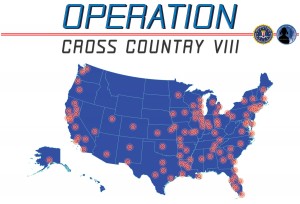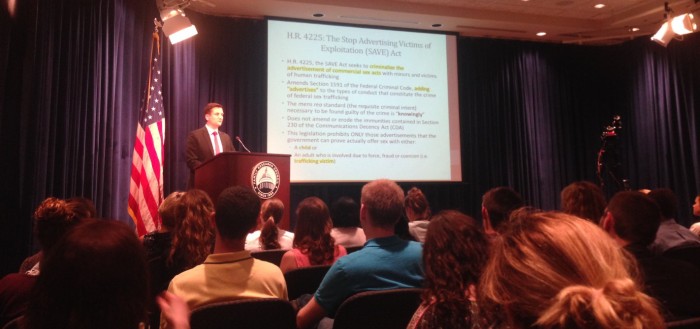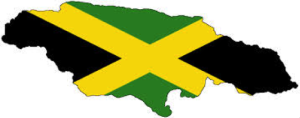As a kid, I was always told that “America is a free country.” Every year, people in the United States take July 4th to commemorate the adoption of the declaration of independence in 1776. This moment in 1776 was truly remarkable, and it changed the course of history forever. Founded on the belief that all people are created equal, and that all men had the right to pursue life, liberty, and happiness, our country separated itself from the Kingdom of Great Britain in order to truly pursue those values.
Equality. Freedom. Life. Happiness. Independence. These are all values that our country, from its very beginning, has believed in.
Unfortunately for us, every year at least 100,000 children are being robbed of those values. At the Defenders USA, we acknowledge that there is a $9.8 billion dollar industry out there that is robbing children of their rights to life, liberty, and the pursuit of happiness. At The Defenders USA, we are seeking to change that fact.
My name is Ethan Morrow, and I am a Defender with Shared Hope International. Tomorrow is the Fourth of July. I would like to invite you to not only celebrate that moment in history when we were granted independence, but to also acknowledge that even in our own free country, not all are truly free.
For the next few weeks, I want to invite you to join us in raising awareness for those that aren’t truly free. I want to invite you to support the restoration and the path to freedom that we seek to provide. In order to successfully do that, we invite you to do the following things:
- Today, we are posting an image and a link to download that image. Its message is simple. “Not All Are Free.” We would like to encourage you to print this out, and take a picture of yourself holding it. Then post it to social media, and tell all of your friends to do the same.
 [dl url=”http://sharedhope.org/wp-content/uploads/2014/07/Not-All-Are-Free.jpg” target=”_blank” title=”Not All Are Free” desc=”JPG” type=”JPG” align=””]
[dl url=”http://sharedhope.org/wp-content/uploads/2014/07/Not-All-Are-Free.jpg” target=”_blank” title=”Not All Are Free” desc=”JPG” type=”JPG” align=””] - Get at least 7 men in your circle of influence to be on board with you. Have them take the Defenders pledge, and begin to engage with this as well.
- Engage with us on Social media. Every day for the next few weeks, we will be releasing new information, maybe some infographics, some videos, and blog content, and even some new challenges that you can participate in. Share that content. Last year, one of our most powerful state grade changes happened through social media advocacy. The more that you share our content with your family and your friends on social media, the more people are going to be aware that not all are free.
The United States is a fantastic country, but everyone needs to know… that not all are free. Join the cause, and engage with us today.


 Even more surprising is the fact that websites earned a total of $45 million in revenue from prostitution advertising in the United States last year. In the average month Backpage.com receives $4-$5 million from these types of ads, which often involve underage children. Legitimate, legal, multimillion dollar corporations are currently profiting from criminal activity and the plight of trafficked children as they generally choose to ignore the fact that their services are facilitating these crimes. It should be noted that not every corporation has disregarded this issue, however, as Google has recently made a highly publicized decision to remove all pornographic ads and links to sexually explicit websites from their services.
Even more surprising is the fact that websites earned a total of $45 million in revenue from prostitution advertising in the United States last year. In the average month Backpage.com receives $4-$5 million from these types of ads, which often involve underage children. Legitimate, legal, multimillion dollar corporations are currently profiting from criminal activity and the plight of trafficked children as they generally choose to ignore the fact that their services are facilitating these crimes. It should be noted that not every corporation has disregarded this issue, however, as Google has recently made a highly publicized decision to remove all pornographic ads and links to sexually explicit websites from their services. By: Gunnar Simonsen
By: Gunnar Simonsen As a native of Jamaica, my anticipations of returning home are always filled with excitement and joy. I think of visiting family members, activities and events and the food. While this trip is filled with excitement and joy it is also filled with a bit of nervousness and fear. For the very first time, I will witness the effects of human trafficking on my island home of Jamaica.
As a native of Jamaica, my anticipations of returning home are always filled with excitement and joy. I think of visiting family members, activities and events and the food. While this trip is filled with excitement and joy it is also filled with a bit of nervousness and fear. For the very first time, I will witness the effects of human trafficking on my island home of Jamaica. I am very honored to join Shared Hope in Jamaica as we conduct a site visit to our Jamaician partners. I will be blogging while I am there so check back as I take this journey of an abnormal return home. Who knows, you just maybe offered a plate of ackee and saltfish (the national dish) and some festival similar to the picture on your right.
I am very honored to join Shared Hope in Jamaica as we conduct a site visit to our Jamaician partners. I will be blogging while I am there so check back as I take this journey of an abnormal return home. Who knows, you just maybe offered a plate of ackee and saltfish (the national dish) and some festival similar to the picture on your right.





